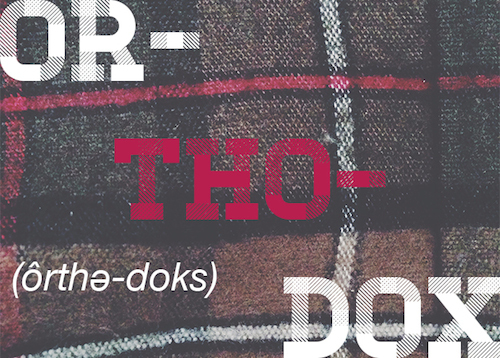In my experiences within both conservative and progressive Christian circles, there seems to be a kind of mutual playing in the politics of fear with regard to the other. On the conservative side, progressives are viewed as morally bankrupt libertine weaklings who lack the backbone to stand up to "the culture." In the words of one famous conservative preacher, this is because they are a bunch of ivory tower elites who are "educated beyond their intelligence."
But on the progressive side, the stereotyping and fear-mongering isn't much better. There is, in fact, an assumption that conservatives are less intelligent and largely uneducated. That they don't have access to or interest in the latest (Jesus Seminar) scholarship or philosophical trends. That they've never heard of - not to mention read - a gnostic gospel. And that they are thus a bunch of anti-science hayseeds whose opinions on a slew of moral issues are primitive and dangerous to society.
In my opinion, both of these extreme ideological perspectives are not only inaccurate generalizations - they are tearing the church apart by creating and perpetuating the antagonism on the other side. Instead of entering into appreciative and generous dialogue in which we try to understand each other, the church is now experiencing the same kind of unresolvable division that the American political system is experiencing. And, as it so happens, both sides in this church schism essentially mirror the sides in our national political schism.
A third way, a middle way, a new way forward is needed. And make no mistake, that will require people politicking in the extremes to make a move toward the center. Which means progressives will have to realize that we are not too smart for orthodoxy.
In fact, as one who finds himself among progressives more often than not these days, I think if we are talking about Christianity, the church, in any historic sense (and not something else entirely), then we cannot get away from the reality and necessity of orthodoxy. Not rigid, exclusionary religious judgment, but a generous, inclusive, missional orthodoxy that is rooted in tradition, grounded in reality, and relevant to the cultural moment we inhabit.
So, without further delay, here's my push toward the center in the form of these three reasons you're not too smart for (a generous, inclusive, missional) orthodoxy:
1. Orthodoxy is not primarily a matter of intelligence. Another way of saying this is that it is not primarily intellectual or educational. Instead, orthodoxy - right belief - is confessional and embodied. In the progressive camp, this has been best put forward lately by Nadia Bolz-Weber and Tony Jones, both of whom argue for a communal way of confessing orthodox belief (even in the midst of doubt, and even when the community believes together but not necessarily individually) and a recognition of the powerful embodiment of orthodox faith in the church's history and current global landscape. To simply disregard or throw away orthodoxy because it doesn't fit well within certain academic streams and structures would potentially be to throw out the historic, global church baby with the theological/philosophical bathwater. There is simply something wonderfully different about the lived reality of the church when orthodoxy is embodied.
2. Orthodoxy is an educated perspective. While it is not primarily intellectual in nature, those who hold to orthodox convictions are often doing so out of rigorous and extensive study, scholarship, practice, reflection, and prayer. While it's true that some Christian institutions are fundamentalist and closed off to newer scholarship and criticism, there are just as many that engage with all the theological, historical, and philosophical data and produce orthodox thinkers and practitioners. As I look at the landscape of evangelical/orthodox thought leaders like N.T. Wright, Scot McKnight, David Fitch, and Cherith Fee-Nordling, along with popular evangelical leaders like Brian Zahnd, Greg Boyd, Rachel Held Evans, and Jonathan Martin, and post-liberal luminaries like Stanley Hauerwas and Miroslav Volf, it is impossible to deny the intelligence - and openness - with which they approach their orthodox convictions. The work of David Fitch in particular maps out a robust, missional, ecclesial orthodoxy to emerge from the rubble of the "end of evangelicalism."
3. Orthodoxy is rooted and unique, but doesn't need to be rigid. What I loved most about Nadia's recent book Pastrix was the honest account of her personal need for a unique, orthodox faith (rather than a Unitarian universality). She found that in historic Lutheranism - and she also found the potential for generosity and inclusion within her denomination. The false conservative/liberal dichotomy needs to fall precisely at this point, because orthodoxy can indeed be generous. And I would argue that a generous orthodoxy is that which has the most promise of actually being a missional and evangelistic force for the global church in our time. Only that which is uniquely Christian will have the capability of drawing people to itself, as it is that which lifts Jesus up.
This is a push to my progressive friends - and an equal and opposite push is needed for conservatives as we identify and vacate the extreme positions on the right (which this blog is often engaged in doing). Together, we might be drawn toward a generous and diverse orthodoxy - really, a Christianity - closer to the center that includes those who identify most as either conservative or progressive. Hell, it may even begin to change the definitions of these labels altogether.
And change the game of our current, divided Christianity in the process.
--
What do you think? Is this kind of vision for a generous orthodoxy realistic? And do progressives need to remember that they're not too smart for it?

